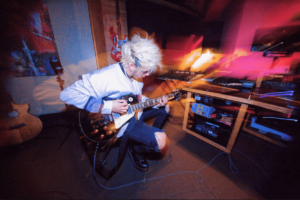Smart Investing In the Music Industry
Here at Rap Fiesta, we get asked this question a lot. Before you start monetizing any business, it’s standard to have initial cash inflow or even a primary investment to kickstart the operations. When you first decide to become a Musician, Recording Artist, Producer, or an Engineer however, that decision is typically when you’re younger than entrepreneurs in other fields. Where most investors in corporate enterprises have been in their field for years and most individuals looking for investments have a degree or a formal education, the young and aspiring Artist doesn’t receive similar advantages. So, how does one invest wisely in the music industry? Use your resources. Some of our first investments come to us through Christmas gifts and Birthdays without realizing. Saving your money from your summer job to buy a new guitar or trading a possession to a friend to get their old turntables. These investments are crucial to your arc of growth and keeping track of them and managing them early can lead to much faster development professionally and personally.
Studio Time:
The biggest investment is Studio Time, and as discussed in “Being Prepared For A Studio Session” you cannot squander this. But regardless of the actual session, you cannot be a Recording Artist without this investment. It’s important to not over or underutilize the studio, especially considering its ever compounding cost. Since you’ll always need to be in the studio, it’s good to base your expenditures there off your income. If you’re serious about being a Recording Artist, you’ll need consistency. Your ability to turn over records at high quality is what makes you a dominant force. Set a standard based on your ability to commit to recording. Once or twice a week, four visits a month, or even 5 Records a month. Make studio time somewhere from 5-10% of your income for an easy and consistent metric. If you can do more go for it, and if that’s unaffordable, the home studio obviously suffices for demos and smaller projects. Working with professional Engineers is a must though, especially the more professional you become. Until someone provides this valuable resource to you free of charge, be prepared to work hard to earn your studio bread.
Equipment:
For Producers or Engineers, your largest investment will be acquiring the technology and software needed to advance your sonic discovery. This depends on taste entirely, so ensure you invest in tools that can enhance your ability to create and offer something to the sounds you’re seeking to create. Smart investing in equipment means isolating specific functionalities in different categories of technology and increasing their quality as you grow your business. There’s no need for a top of the line Nuemann microphone when you’ve been Engineering for three months. It would be like putting tints and rims on a 1987 Toyota Corolla. Work with what fits in your budget. Begin your studio journey in the “box,” meaning inside of your laptop or computer. Until you can afford Analog equipment and real synthesizers, opt for VSTs. Even software can be expensive so scour Youtube and Reddit for suggestions on free emulators that can perform similar operations as the higher tiered gear. For instance, Spectrasonics Omnisphere is notorious as one of the most effective and coveted synthesizers, but until you can put up the retail $479.00 Logic Pro X comes stock (free at the base level) with Alchemy, a less effective but still powerful synthesizer. Learn the fundamentals of your craft on fundamental tools and as your needs and prowess outgrow the utility of your gear.
Collaborations and Features:
Collaborations and features are B2B (Business to Business) marketing. Your brand is capable of, for the duration of the professional relationship and existence of the product, accessing the consumer base of another brand. These crossovers give you a pool of consumers to tap while sharing content with another Artist or Producer or Professional. Know that the collaborations you invest in will reflect back onto your brand, so ensure when you do invest in these that they are worthwhile. Don’t work with everyone but don’t work with no one. Be selective; curate and vet the individuals that effect your business. Don’t collaborate with someone because of envy or a recognition that their brand is more elevated than yours. Success doesn’t always guarantee a return. Work with the people that inspire you, the artists that challenge you, and the professionals that impact your craft positively. It’s important to recognize that collaborating can devolve into a PR nightmare, solely off of association. You don’t want to impact your brand negatively because you were itching for a come up. I’ve found the best Collaborations and Features are from those that pursue you. If you’re worth contacting, there’s an effort on the other party’s part that may reflect an actual want to receive your creative energies. Symbiosis, not business. If it’s all mechanical you lose the organic qualities of music that create truly everlasting content.
Promotion:
As referenced in “How Do I Commercially Release A Song?,” there really is no point to releasing content that doesn’t reach anyone. At that point, you’re just making things for yourself. Demos and getting studio practice are one thing, but we all know multitudes of artists that complete songs that are strong with potential, and then they squander it with a weak release. Spend money helping your product reach other people. There are a hundred different ways to promote, but the important part is that regardless of the route you take, you spend the appropriate amount of money on them. For every person that hears your Record, it’s another possibility for someone else to hear it past them. In an industry where 6 degrees of separation is very real, you’ll want to maximize the spread of your release or your content. Target areas at all stratifications of geographical location (Local, State, Region, Time Zone, National, International). If you’re throwing an event, hand out flyers and create a e-list to send reminders and updates. The point is, people need to know they need to consume something. You’d be surprised how many stores and shops can take care of the services you require, but because of Advertising and Promotion, who do you decide to go to? This is part of the reason mom-and-pop and independent businesses suffer at the hand of corporate entities. Sinking millions into Advertising and Promotion can be the difference between “Sallies pop up,” and Kohls.
Travel:
As you expand your professional career, you’ll need to take trips. Travel is extremely valuable because it personally introduces you to new terrains and new markets to navigate. It’s similar to collaboration except being physically on the terrain means you can put your face forward. It’s less about brand and more about personal interaction. The people you’d meet locally versus regionally and nationally are very different. Media hubs like New York, Chicago, Atlanta, Toronto, the DMV, and Los Angeles boast more accessible Industry presence meaning more interactions that are worth your time per capita. Locally, you’ll build your fanbase, but expanding anything requires actual expansion. Expand your horizons, your mindset, and your ability to be places. Save for the plane trips, gas on the road for your first tours, networking opportunities, etc. Eventually someone will deliver that call to you that changes everything and you’ll need to know how to navigate getting from point A to point B, and have the budget for it.
Vanity:
HipHop may be the only art form that derives a vast amount of its worth from its strong cultures of Fashion and Jewelry. Whether it should be like this or not is really besides the point considering the rampant presence. It’s important to know that this isn’t a primary investment, but when you find you have the time, garner an authentic image and aesthetic for yourself. Especially in the age of instagram, the visual portfolio for your human and brand existence, nothing turns off consumers to artists whose success they can’t compartmentalize. It’s not all about chains and rings or Tom Ford suits, but it is about looking sharp, presentable, and sexy. This is Entertainment, after all. The truth is, the cleaner the look, the more success you’ll find. Get yourself a shirt every now and then. It could be argued that this isn’t necessary at early stages, but if the point of building a business prior to outside investment is to illustrate you can run the model, then all facets of that business that would eventually be covered should be explored at a low level. The labels will not let you show up to the photoshoot with unkempt nails, a receding hairline, and off brand Kmart clothing. It’s just professional. Buying clothes won’t make your music better, and buying jewelry won’t promote your music, but as a tertiary aspect, after those things are viewed and the consumer goes to your instagram, you’ll want to look the part. Simple.
Professionals:
Professionals are something you can’t skimp on. These are the other people in your circle that handle the tasks you can’t. Since you’re not a lawyer, you shouldn’t be handling your own contracts, but someone will need to. You’ll need to pay that person. If you can’t independently license your own song, you’ll need to pay a Publisher. Professionals fall under every category aforementioned. The more professional you become, the more you’ll realize there are standards for services that absolutely must be met. When you’re handling million dollar valued assets, records, contracts, or artists, you can’t slip on these. Your engineers will need to be accomplished, equipment effective and innovative, collaborations organic and successful, promotion handled, travel expenses covered, and the hems on your suit proper. These investments create you, the entity, who will be consumed across all of these categories. Perfected and invested in properly, and with time, you’ll develop the full picture that you view most of your favorite artists in.
If you liked this breakdown and would like to learn more, check out our Industry Knowledge Guides.




